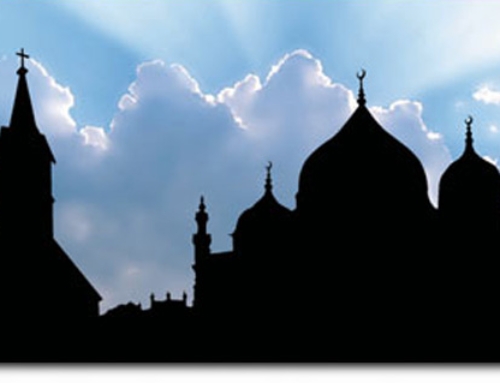By: Salman Yazdani
The Space Shuttle Columbia Disaster: A Reminder That We Are All in God’s Hands
February 1, 2003 – Shortly before the scheduled end of its 28th mission, space shuttle Columbia disintegrated over Texas and Louisiana as it reentered Earth’s atmosphere, killing all seven crew members. It was indeed an unexpected, abrupt and horrible end of a momentous journey.
Can anyone believe that NASA, by any stretch of imagination, expected this catastrophic end to Columbia? And, were they so careless as to neglect preparing themselves to the minutest details to avoid such disasters? Your answer to both these questions would most probably be ‘No.’ Then, why did it happen?
How does Islam Reconcile Free Will and Destiny?
Of course, it was the choice of those seven crew members to travel in the space shuttle, but they didn’t opt for that tragic end. And, herein lies the difference between the Islamic concept of destiny and the free will we human beings possess – we’re free to choose our actions but God has ultimate control over the outcome of those actions. According to teachings of Islam, God (Allah in Arabic) has given humans free will to make choices in their lives but only God has foreknowledge of our destiny, and He has total control over it. (Read more: Concept of God in Islam)
Is every event of our lives predetermined? Is our entire course laid out for us and no matter what we do or how we try to avoid it, our lives will unfold in some predetermined way? Is there such a thing as fate or destiny? If so, what about free will? Aren’t we supposed to have the freedom to choose our actions? Isn’t free will negated if fate exists?
Predestination: An Islamic Perspective
To understand the Islamic perspective on destiny and free will, we first need to know a few basic facts which form the foundation of faith for Muslims:
1- God is the Only Sustainer of the whole universe and He is the Most Merciful. The Quran begins with, “Praise belongs to God, Lord of the Worlds, the Lord of Mercy, the Giver of Mercy…” (1:1-2)
2- God has created humans in the finest state. God mentions in the Quran: “We have certainly created man in the best of stature.” (95:4)
3- The primary objective of human life is to worship God. “And I did not create the jinn and mankind except to worship Me.” (Quran, 51:56). It must be noted that the Islamic concept of worship encompasses all human endeavors that are pursued for just ends, and in accordance with God’s commandments.
4- Our life is a test and we’ll be judged for our actions in the hereafter. God says in the Quran, “Blessed be He in Whose hands is Dominion; and He over all things hath Power; He Who created Death and Life, that He may try which of you is best in deed: and He is the Exalted in Might, Oft-Forgiving.” (67:1-2).
5- He’s All Wise, and He tests us according to our strength. The Quran cites: “God does not burden any soul with more than it can bear: each gains whatever good it has done, and suffers its bad.” (2:286)
6- God is Omniscient and Omnipresent – i.e., he is fully aware of His creation and is always present. He is also All Powerful, so whatever He decrees takes place, and whatever He does not will does not happen. God – there is no deity except Him, the Ever-Living, the Sustainer of [all] existence. Neither drowsiness overtakes Him nor sleep. To Him belongs whatever is in the heavens and whatever is on the earth. Who is it that can intercede with Him except by His permission? He knows what is [presently] before them and what will be after them, and they encompass not a thing of His knowledge except for what He wills. His Throne extends over the heavens and the earth, and their preservation tires Him not. And He is the Most High, the Most Great. (2:255)
Islam Teaches That We Have Free Will, But God Ultimately Controls Our Destiny
In other words, humans are God’s best creation who have a special purpose in life, i.e., to worship Him. Islam teaches that in order for us to freely perform in the test of life, He has given us free will to lead our lives as we wish, but the outcome of each of our actions is governed by the will of God. If God does not will for something to take place, it will not happen no matter how hard we try. And if He wills for something to occur, it will transpire no matter what we do to stop it.
The Importance of Striving in Life, According to Islam
One may say then, “What’s the use of striving in this life if we will get what is already decreed by God?” This seems logical, but it is, of course, a misconception. In fact, Islam places great emphasis on making efforts towards a desired end. In the Quran, God says, “And that there is not for man except that [good] for which he strives And that his effort is going to be seen – Then he will be recompensed for it with the fullest recompense And that to your Lord is the finality”(53:39-42).
Again, making an effort is part of the power we have in the form of free will – if we waste it away with a complacent attitude, then we’re being ungrateful for the blessing we have. We must do everything within our power to optimize our lives – at the same time, we must recognize that God’s power and domain are far greater. He is not thinking only about us, but for the entire humanity, the whole world, nay, the universe itself! He is the One who, through destiny, balances the lives of humans, animals, plants, while at the same time harmonizing planets and other celestial bodies.
How Islam Explains the Existence of Evil
Many people protest that if God controls everything, why does He allow massacres of innocent people, torture, disease and the worst forms of evil to exist? Indeed, Islam does not ascribe evil to God. God allows tragedy and misery to take place in this world for reasons which often escape humans; it could be a test for those people, a form of purification, or warning for the rest of us to rehabilitate our lives. The Ultimate Truth is known only to God and our conviction is that God is Just and Good, even in those matters where we do not understand His Will. The Quran gives us a glimpse of this in the interaction between Moses and a learned man in Chapter 18, verses 60 through 82.
In addition, God has ordained accountability for humans on the Day of Judgment, when He will reward us for obeying Him and acting righteously in this world or punish us for transgressing His limits and living a whimsical existence. This further proves the importance of free will in our lives. God will judge us according to the choices we make in this life, not based on the destiny He has decreed for us. The Quran confirms this as: “Whoever does righteousness – it is for his [own] soul; and whoever does evil [does so] against it. And your Lord is not ever unjust to [His] servants.” (41:46).
The Impact of Belief in Divine Destiny
Truly, when we accept the Divine Destiny we lead a more satisfying and productive life. When we don’t get what we wish or strive for, our belief in divine destiny prevents us from becoming despondent or frustrated. We accept the tragedy as a test from God and submit to His will with patience and dignity.
And if our plans work successfully or something good happens to us, belief in divine destiny will prevent us from becoming too boastful or arrogant. Many successful people feel that their wealth and status are because they are smarter, wiser, stronger, or just more deserving of success than others. But the truth is, they may have made certain choices, it is God who made those choices work out well for them.
God says in the Quran, “No misfortune can happen, either in the earth or in yourselves, that was not set down in writing before We brought it into being––that is easy for God–– so you need not grieve for what you miss or gloat over what you gain. God does not love the conceited, the boastful” (57:22-24). This mindset helps us live a fulfilling and happy life. We become more thankful and learn to give empowering meanings to our experiences, whether good or bad.
The Islamic Concept of Destiny and How It Can Help Us Live a Better Life
The belief in divine destiny is also a great source of courage. When we know that no calamity or harm can touch us without the will of God and the time of our death is prefixed, we lead a righteous and valiant life. Quran mentions:
“Say, ‘Only what God has decreed will happen to us. He is our Master: let the believers put their trust in God.’” (9:51)
“Wherever you may be, death will overtake you, even if you should be within towers of lofty construction…” (4:78)
In conclusion, Destiny is one of the articles of faith in Islam. It teaches Muslims to make the most out of their resources and leave the results to God.
Got Questions?
We have Answers. Get in touch now.








